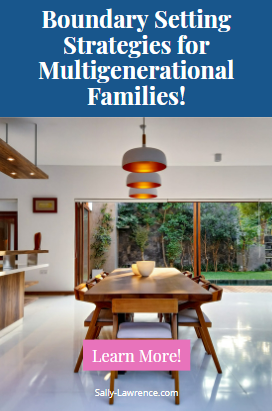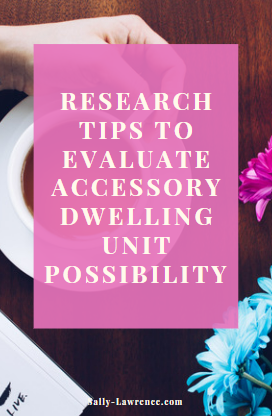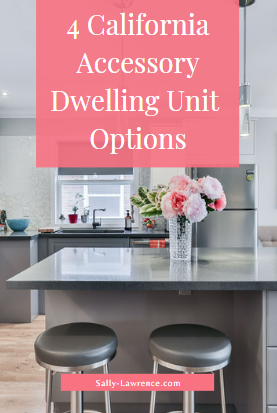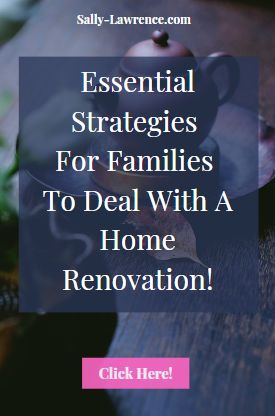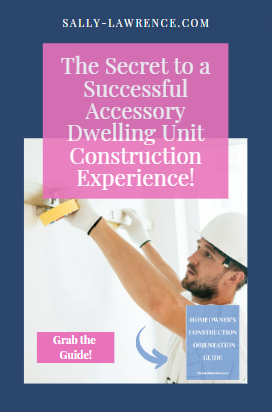Boomerang Kid Affordable Housing
On Family Property!
by Sally Lawrence

Ever wonder how your adult kids will ever be able to find affordable housing in your high-priced housing market?
This is even more true these days with the economy and job market being so competitive. While more seasoned job seekers with years of work experience can have a competitive edge, often the fresh out of college graduate or job seeker with little work experience struggle to be competitive. Not only that but with housing costs still continuing to be high, being able to afford to house and in a way that affords a quality of life can be elusive during this life stage.
Although our children grow up and become adults, we never stop being parents and looking out for them no matter their age. Even though they are college graduates, we can see the glimpses of our baby...

This is especially the case when life events, economic pressures, or COVID-19 have made affordability even more unattainable in high-priced housing markets. The odds are stacked against young adults in these markets and it’s no wonder that parental instinct gets triggered!
As a result, many of us have invited grown kids to live back at home to have a safe landing place during turbulent times. An accessory dwelling unit creates the opportunity for boomerang kids to have affordable housing on family property!
For those of us cohabitating with a young adult kid, it is so lovely to have them return to the nest or stay in the nest, isn’t it? No shortage of company for walking the dog or watching NHL games or Dexter episodes.
But, there's always a but, right?

There's a yin and yang vibe happening. It is so loud at all hours of the night with the hollering during gaming with friends online. And it’s all coming back to how one person could leave such a huge mess. Like a trail of bread crumbs, you know exactly where they hung out in the house.
Preserving a good family connection while also honoring the developmental tasks that come with young adulthood is such an important balancing act.
As a parent, we never stop looking out for our kids and want them to succeed as an adult and acquire all those adulting skills.
This post covers 3 strategies showing how an ADU can not only offer an affordable housing option but can also support some shifts to have all the positives of adult kids back in the home without the nuisance for both sides.
You’re in Good Company…:
Well, it turns out that we are in good company. The Pew Research Center reports that 52% of young adults live with their parents. This trend hasn’t been seen at this level since the Great Depression. With the pandemic and all, it makes sense, right?
Well, turns out it's not just a pandemic occurrence, but actually, the pandemic accentuated an existing trend that was already happening.
It kinda matches with what I have been chatting with other mom friends as well as in the counseling field. There is a cultural shift taking place with an extended adolescence where 25 is the new 18. I mean I remember biking to school at age 6 along busy urban streets, but my kids were driven to school and picked up even up and through high school.
Whatever the root cause, this trend is here and there are important moves to consider to honor their life stage while also preserving the family connection.
Affordable Housing ADU for Young Adults Strategy #1: Autonomy for Young Adults & Letting Go of Control for Parents
Interestingly enough, my own experience with accessory dwelling units started as a young adult. In my early 20s, after grad school, I returned home to live with my parents as I began to look for my first official job in my field.
Returning home was expected in my culture. As a Japanese American female, you live with your parents until you get married. It was great to have the safety net of a home base and I will always appreciate my parents’ open door to their home policy.
After a while, though, I felt the need for space to focus on building my own life.
I found that perfect space in renting out a garage ADU in the same town. It was a tiny studio set up with its own sweet backyard. And it was the first time I have ever lived alone. As an introvert, it was heaven and as a young woman, I felt safe living in the backyard of a residential property. There, I had the space to develop my autonomy and strengthen my life skills.
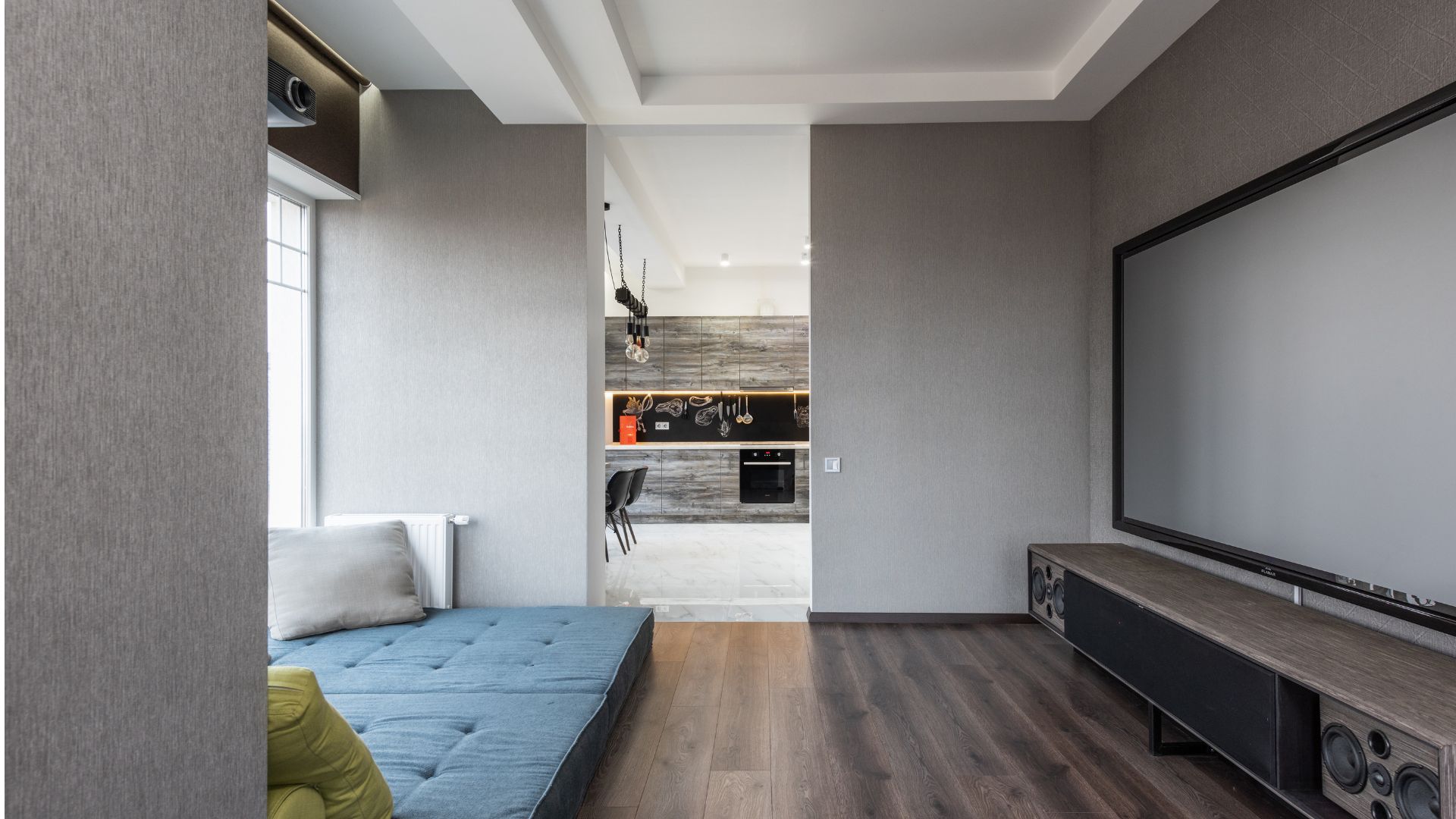
What does autonomy mean? Well, my friend, it is about accepting responsibility for oneself, making independent decisions, and becoming financially independent. It is about learning to grow into confidence about making decisions and accepting responsibility for those decisions and their consequences, good and bad.
Back then, money was very tight and my job didn’t cover all my costs, so taking responsibility for my own decisions meant taking on a gig cleaning my aunt’s house instead of getting a quick handout from my parents.
But, this stage in life is a transition or an” in-between” one, too. During this process, paying for rent, food, clothing, car maintenance all made sense, but it took a while to take over the last milestone of paying for my own car insurance.
Although I broke the “rule” of leaving home before marriage, my parents and I managed to navigate that bump in the road. I was always very connected to my parents and now that I had all the space I needed, I found myself at their home several times a week for dinner and even spent an occasional weekend there to enjoy spending time together and as a break from adulting (incessant daily cooking and cleaning).
Leaving home also meant that my parents had to adjust to give me the space to make my own decisions about navigating life. They definitely gave their opinion about my decisions, but our role changed from parent to child to mentor to grown kid. Having my own space reminded me how much I appreciated them and allowed me the room to grow into adulthood.
An ADU like a garage conversion or studio/1 bedroom unit can create a space in the home that encourages young adults to continue with their developmental tasks of achieving autonomy and independence, establishing their identity, values, and world views, as well as maturing emotionally.
Now with the rise in accessibility for accessory dwelling units, families can set up this type of space for grown kids to develop and become independent while living on the same property.
Affordable Housing ADU for Young Adults Strategy #2: Boundaries & Privacy for Young Adults & Parents
Privacy is a big priority at this age for young adults who are seeking to have space on their own.
If your adult kid had the opportunity to go away to college or live on their own, he or she is used to privacy, independence, and freedom.
There were opportunities to build adulting skills like taking care of their own place (or not), paying some bills, cooking (or microwaving), and the freedom to choose what, where, who, and how to do things.
All without mom or dad peering over their shoulder giving feedback.

Actually, Jeffrey Jensen Arnett's book, “Emerging Adulthood: The Winding Road from Late Teens Through the Twenties”, talks about how nearly three fourths of 18-29 year olds agreed that “I would prefer to live independently of my parents even if it means living on a tight budget.”
There is something powerful in fully owning how to build and navigate life.
Now, this doesn’t mean disconnect from parents, but it does mean control and choice about turning to parents for support or feedback. Respecting boundaries and being mindful of privacy allows rich opportunities to help grown kids to learn life lessons independently and also build the important skill of learning when and how to ask for help.
When I was renting that garage conversion accessory dwelling unit, this privacy allowed me to navigate the ups and downs of dating, learning skills for communicating, and handling conflict in a serious relationship with my then-boyfriend, now husband.
Although there was sometimes unasked feedback from my parents, boundaries,and privacy helped to lessen the "noise" and allowed me to strengthen hearing my own "voice", which is so foundational as an adult.

And, let’s NOT forget, this goes BOTH ways. Everyone needs their privacy and boundaries respected. Whether you got used to having an empty nest and are adjusting to having a kid back in the house or if the house has had kids around continuously, it is totally a healthy thing to have boundaries and privacy respected.
The days of little kids barging into the bathroom without knocking are long gone. This sweet period (maybe?) was appropriate at that stage but definitely not for later stages.
Now it wasn’t all sunshine and rainbows for me or for my parents or me as a parent of a young adult of my own.
But, wouldn't it be awesome to mold your home to support this developmental task for your grown kid and this shift in your role as a parent?
Adult kids could have the privacy of their own space with their own entrance but still be closeby which facilitates family connection.
Affordable Housing ADU for Young Adults Strategy #3: Responsibility for Young Adults & Support for Parents
The top three consequences that parents in the Clark Parents Poll observed from having their grown kids at home were all positive, with 67% of parents saying they feel closer to their child emotionally, 66% saying they have more companionship with their child, and 62% saying their emerging adult helps with household responsibilities.
For this last point, we are focusing on this point about grown kids helping with household responsibilities.
First, let’s talk about the why. Remember, how I talked about young adulthood as a transition? Well, having grown kids help with household responsibilities helps them in their developmental task of learning how to manage their own household and further strengthens the growing of their life skills.

So what does this look like? Well, it can look like grown kids paying rent and/or paying for some of the utilities or doing household chores like cleaning the bathroom or grocery shopping for the family, etc.
This is an opportunity to really support grown kids in this area. Being able to manage their household and themselves is a necessity in life.
They have got to learn this sometime!
Learning this lesson at home in a transitional and incremental way can save them from a sudden, steep, uphill trek later in life.
I grew up in a household with super traditional gender role beliefs where girls were supposed to do the cooking and cleaning and the boys were supposed to help with the gardening. Growing up, I wasn’t thrilled with this system but have made peace about it.
Well, this meant that I knew how to make meals like chicken curry and rice just fine but there were weeds everywhere in my yard. And figuring out how to use a lawnmower in my late 30s was not fun. Not to mention that my brother went to college not knowing how to do his own laundry.
A family discussion about what role family members play in supporting the household and even formalizing this agreement in a lease could be a great way to support growing these skills for your grown kid. This also supports that role transition of treating your child like an adult which is key for a successful transition to living back at home.
Conclusion:
Although our children grow up and become adults, we never stop being parents and looking out for them no matter their age. Especially when things are stacked against them like a high-priced housing market, tough economy, or COVID-19. This trend of adult kids living with their parents is on the rise.
While living together can be great in so many ways, it can also be challenging.
Well, an accessory dwelling unit or granny flat can help parents and grown kids live together by supporting young adulthood developmental tasks but without the crazy. An ADU offers an opportunity for grown kids to continue developing autonomy by giving them the space to grow responsibility for themselves, making independent decisions, and becoming financially independent. The second benefit of an ADU is that by being a distinct and separate space, it promotes boundaries and privacy for both young adults and parents. This privacy and being mindful of boundaries can allow young adults to lessen the “noise” and strengthen their own “voice” which is so critical in navigating life and developing more complex relationships. And lastly, an ADU can help facilitate grown kids to learn how to responsibly manage their household and self. Formalizing expectations about family member roles and responsibilities are so helpful along with the option to formalize family agreements or lease.
Living under the same roof as your boomerang kid can be a balancing act.
Ready to create agreements for a peaceful home?
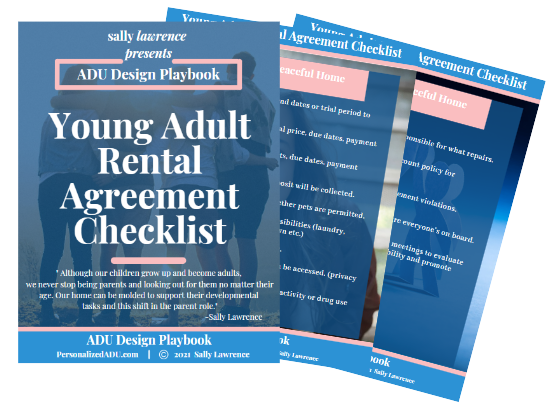
CATEGORIES
FEATURED POSTS
-
Accessory Dwelling Unit Benefits For Families.
-
Boundary Setting Strategies For Multigenerational Families.
-
Research Tips To Evaluaate Accessory Dwelling Unit Possibility.
-
4 California Accessory Dwelling Unit Options.
-
Essential Family Strategies To Deal With A Home Renovation.
-
3 Simple Strategies To Save Money On Your Accessory Dwelling Unit.
-
The Secret to a Successful Accessory Dwelling Unit Construction Experience.
Get The Accessory Dwelling Unit
Cost Saver Free Guide
Six strategies for significant savings
on your ADU Build!
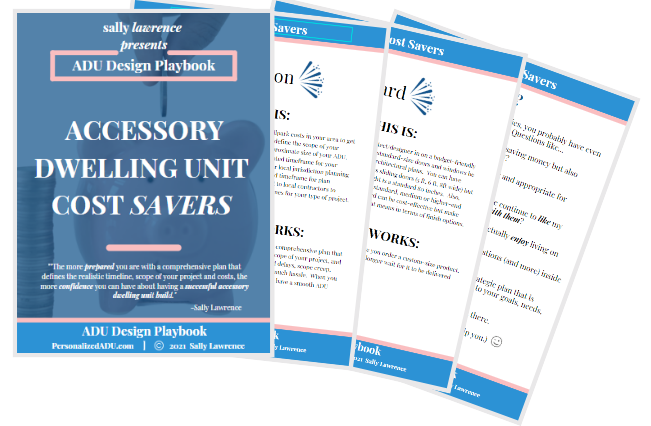
Your information is kept
100% private & never shared. As a bonus,
you'll receive emails with offers + helpful tips.
You can unsubscribe at any time.
© 2023 Copyrights by Sally Lawrence. All Rights Reserved.


